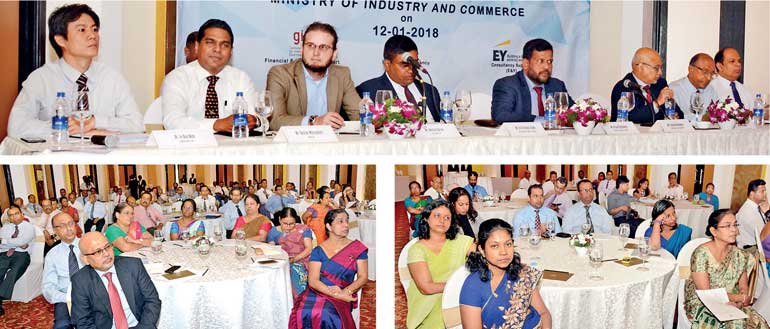Friday Feb 27, 2026
Friday Feb 27, 2026
Friday, 19 January 2018 00:00 - - {{hitsCtrl.values.hits}}

 Two key stages in the implementation of Sri Lanka’s current SME Policy Framework got underway last week. The two stages were identified as the systematic review of legal and regulatory constrain pertaining to SME sector and a comprehensive assessment of the institutional structure, which provide services to SMEs. Both these assessments had been recognised as one of the pre-requisites in the effective implementation of the SME Policy, which was presented to Prime Minister Ranil Wickremesinghe by the Ministry of Industry and Commerce in the 2017.
Two key stages in the implementation of Sri Lanka’s current SME Policy Framework got underway last week. The two stages were identified as the systematic review of legal and regulatory constrain pertaining to SME sector and a comprehensive assessment of the institutional structure, which provide services to SMEs. Both these assessments had been recognised as one of the pre-requisites in the effective implementation of the SME Policy, which was presented to Prime Minister Ranil Wickremesinghe by the Ministry of Industry and Commerce in the 2017.
This initiative will be spearheaded by the Ministry of Industry and Commerce along with National Enterprise Development Authority (NEDA).
Financial and technical assistance for the project is provided by GIZ Sri Lanka – SME Sector Development Program. Furthermore, Earnest & Young Advisory Services is designated to carry out the institutional assessment while F.J. & G. de Saram, reputed law firm had been assigned to review legal environment related to Sri Lankan SMEs.
Speaking at the launch event Minister of Industry and Commerce Rishad Bathiudeen said, “The Government of Sri Lanka has assigned high priority to the development and strengthening of the SME sector to be a sustainable sector of the country’s economy and to link to global markets. We believe that SMEs are more than 70% of the total number of enterprises in the economy providing 45% of the employment and contributing to 52% of the Gross Domestic Production (GDP). Therefore this is a vital sector to the entire economy.”
“With the increasing trend of globalisation the SME sector has become a driving force for ‘growth and development’. As a result, the Government of Sri Lanka has assigned high priority to the development and strengthening of SME sector to be sustainable linking to global markets,” added Minister Bathiudeen. The Minister thanked GIZ Sri Lanka for supporting the initiative.
The SME Development Action Plan developed and approved by the Ministers of Cabinet in 2017 is expected to achieve the defined objectives in the SME Policy Framework, which was developed in 2015.
It is based on six policy intervention strategies articulated and creating enabling environment is one main area to be addressed to improve the overall business conditions to be SME friendly.